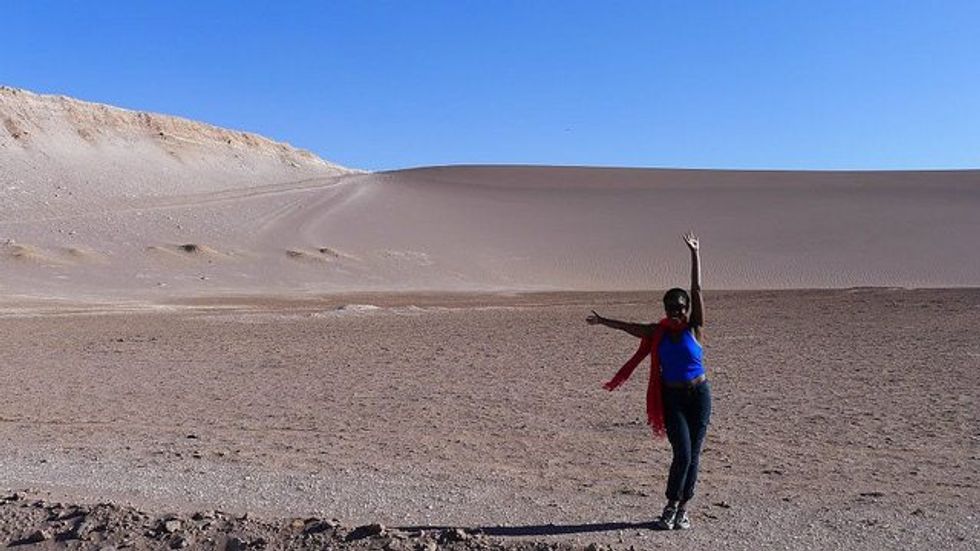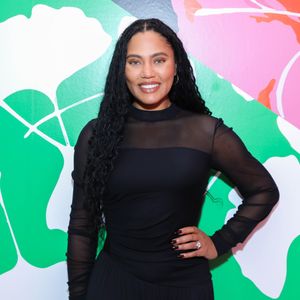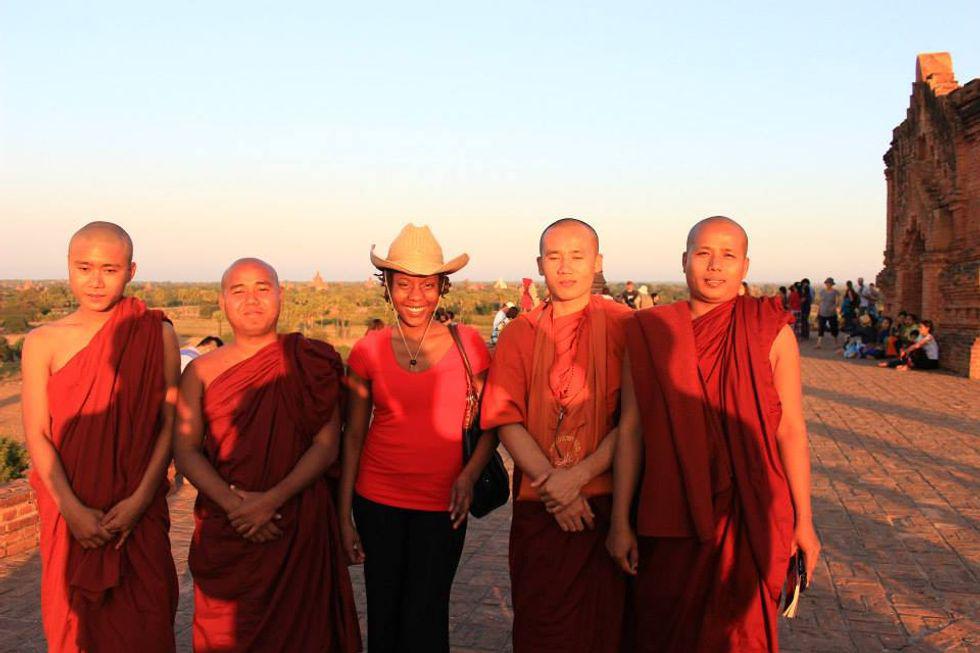
I Am 32 And Have Traveled To 70 Countries
One of the biggest concerns for people who haven't had the opportunity to travel abroad is that they don't think they can afford to, and Oneika who has traveled to over 70 countries has advice that is simple: Sacrifice a few pricey items and materialistic things so that you can experience moments and memories that will last a lifetime.
Playing Mas in the Caribana parade, Toronto, Canada
Dear Necole,
My name is Oneika and my not-so-secret secret is that I'm a travel addict. At the ripe old age of 32 I have traveled to 70 countries on 6 different continents and have lived and worked in France, England, Mexico, and Hong Kong. For too long people have thought that Black folks don't travel. We are out here! Thank you for using your platform to show our people that they can and should go out and see the world.
To be honest, the travel bug bit me a bit late. As a bookworm-ish kid growing up in Toronto, Canada, travel was the furthest thing from my mind. Not to say that I didn't travel at all-- my parents are Jamaican, so we made trips back to the island and also visited family living in various cities in the U.S. But I always felt like trips to faraway destinations like China, Argentina, and South Africa were largely out of my reach. After all, I never saw or heard of anyone who looked like me doing stuff like that, and the books I devoured in my youth rarely featured characters- never mind travelers- who were Black .
Luckily, things changed when I got to college. I remember making friends with two very nice Black girls and discovering that they were heading to Spain and Morocco for Spring Break. I was like, "What?! You can do that?" Flabbergasted, I was immediately forced to challenge my foolish subconscious belief that "we" couldn't travel to places like that. After doing away with such a foolish notion, I applied for, and was accepted to, a year-long study abroad in Nantes, France during my junior year.
It was a life-altering experience: I met people in my dorm who came from countries I never knew existed (Comoros and Chad and Algeria-- former French colonies), and backpacked in Spain and Morocco, just like my two girlfriends had done during Spring Break the year before. A seed had been planted and I was hooked on travel.
The rest, they say, is history. After my study abroad, I knew I was destined for a life on the road. I plotted and schemed and realized that I could sustain myself by teaching abroad. The first year, I moved back to France and taught English as a Foreign Language on the French Riviera; after that, I got a elementary/secondary state teaching credential that allowed me to teach high school English Lit and French in private schools in Mexico, London, England, and Hong Kong, where I am currently working and writing this email from.
Running with the bulls in Pamplona, Spain.
At the Atacama Desert in Chile
The Atacama Desert, Chile

I have been to the Taj Mahal at dawn, eaten with locals in Guatemala, and walked along a stretch of the Great Wall of China. I've gone to a dancehall reggae club in Tokyo and run with the bulls in Spain; I've traveled with my mom to Rome and Berlin (she is always up for globetrotting with me!) and even met my husband while teaching in Hong Kong. I have also travelled solo in Chile and Mexico and Belgium, amongst other places. All in all, I have gone through 5 passports and have an infinite amount of memories (and pictures) from these years of travel.
A few of my tips:
- Prioritize your spending. You say you can't afford to travel internationally, but those Louboutins you just bought could have scored you a plane ticket to London. That night out at the club popping bottles? Equivalent to a week of accommodation in Brazil. Point is, you probably *do* have the money for travel, you're just spending it on other things. Monitor your outgoings and allocate savings for your dream trip.
- Travel for less and on someone else's dime. Websites like ThePointsGuy.com help you to accrue and use air miles so you can travel smarter and cheaper. Programs like Vaughn Town and Pueblo Ingles provide free room and board in Spain in exchange for conversing in English with Spaniards eager to learn. There are many ways to make travel more affordable, you just have to look and get creative!
Hanging with Buddhist monks in Bagan, Myanmar
- Seek opportunities to live abroad. If you're still in school, study abroad programs are a great way to facilitate your first international experience, and many of them offer scholarships. If you're finished school, look into programs like the Peace Corps -- they have 3-24 month volunteer opportunities worldwide. Need to make money? Think about getting into teaching. If you're not already a primary or secondary teacher in the U.S., consider getting a TEFL/TESL certification that will allow you to teach English abroad. Already comfortable in your career and hate teaching? Ask your job for a short-term international transfer.
- Just go. Don't let the opportunity to travel pass you by. Don't wait for friends to jump on that plane, train, or automobile with you. Solo travel is sexy: you can do what you want, when you want, and on your own terms. Web-based forums like Couchsurfing have also made it easier to connect with locals when you get to your destination as well. So you're never really alone unless you want to be.
Anyway, I've rambled enough. Bottom line: getting hooked on travel is hands down the best thing that ever happened to me. I can't imagine life without it now!
Thanks again for allowing me to share my story! I've attached some photos of my travels. I write a blog called Oneika the Traveller (www.oneika-the-traveller.com) that chronicles my adventures abroad as well as my tips and tricks for travel. :-)
Best,
Inkier
Bali, Indonesia
Machu Picchu, Peru
ItGirl 100 Honors Black Women Who Create Culture & Put On For Their Cities
As they say, create the change you want to see in this world, besties. That’s why xoNecole linked up with Hyundai for the inaugural ItGirl 100 List, a celebration of 100 Genzennial women who aren’t afraid to pull up their own seats to the table. Across regions and industries, these women embody the essence of discovering self-value through purpose, honey! They're fierce, they’re ultra-creative, and we know they make their cities proud.
VIEW THE FULL ITGIRL 100 LIST HERE.
Don’t forget to also check out the ItGirl Directory, featuring 50 Black-woman-owned marketing and branding agencies, photographers and videographers, publicists, and more.
THE ITGIRL MEMO

I. An ItGirl puts on for her city and masters her self-worth through purpose.
II. An ItGirl celebrates all the things that make her unique.
III. An ItGirl empowers others to become the best versions of themselves.
IV. An ItGirl leads by example, inspiring others through her actions and integrity.
V. An ItGirl paves the way for authenticity and diversity in all aspects of life.
VI. An ItGirl uses the power of her voice to advocate for positive change in the world.
Let’s make things inbox official! Sign up for the xoNecole newsletter for daily love, wellness, career, and exclusive content delivered straight to your inbox.
Between the rise of the creator economy and the gig economy, the window of opportunity to leverage your creativity for long-term gain has never been more potent.
For the last four years, I’ve worked as a full-time freelance writer and content creator. A year into this journey, I knew that if I wanted to create a sense of structure around my life outside of a traditional 9-5, I would have to create it.
To my surprise, that came in the form of social media.
Now, you might be wondering how someone might be able to juggle their work in a creatively-dominant career like writing while still having the mental capacity to produce ideas for their own personal brand, and well, that answer didn’t come easily.
In 2021, I hit a wall with writing and content creation.
With the stress and uncertainty that came as a result of the pandemic, to being burned out from having to live off my creativity, I reached a breaking point. For me, writing was always a space to explore my thoughts, process heavy topics, and express concepts that only words could bring reason to. However, when I didn’t have the brainpower to write or create content, I knew it was time to set parameters around my hobby of content creation and my passion for storytelling.
In this case, the biggest challenge was finding the balance between the two by releasing the guilt and shame of taking a break from both in order to reconnect with them.
Through years of trial and error, the fog finally cleared, and I was able to hit my stride in 2023. From garnering over 10K followers on TikTok, building an Instagram community around lifestyle and creative encouragement, along with my wellness collective, Black Girl Playground, and writing for xoNecole as a lifestyle contributor, the creative juices have been flowing steadily.
And it all happened by creating a strategy that allowed space for planning, resting, and creating. Today, I’ll be sharing my top tips to help you find your balance between your side hustle and passions.
On staying inspired and motivated when working on various content creation and freelancing projects:
Early this year, I came to the bright conclusion that I needed to shorten the gap between ideation and execution — and it completely changed how I create.
Oftentimes, when we have an idea come to us, we let it sit for too long, and then before we know it, we’ve either lost the enthusiasm to put it into action, or someone else grabs it. If you want to stay in a flow of creativity, whether side projects or full-time work, it’s important to not get slowed down by self-doubt, procrastination, or perfectionism.
Give yourself permission to act on your ideas as they come to you. Even if they’re a little muddy or not “perfect,” you can always fine-tune them later.
@yagirlaley shrinking the gap between [ideation] + [execution] 🧠💡#fyp #creativeadvice
On the importance of choosing a niche:
If there’s one thing that has helped me balance my work as a writer and content creator, it’s putting each in its own niche (or category). By definition, a niche is a specialized segment of the market or a specific area of expertise.
When you are creating in the same niche that you’re also making a living in, that’s an easy way to get your wires crossed. And at times, this could lead to feeling as if you don’t have any ideas for yourself because you’ve given them to the other area you're juggling.
When balancing two, you want to have enough fresh ideas to give to your personal projects and your full-time work to avoid any overlap. This ensures that your personal creative vision isn’t compromised when working on client projects while still having some for yourself.
On the strategies that have helped to maintain a consistent workflow in both areas:
I can’t stress enough how important it is to create a workflow and structure for yourself as a freelancer — this applies to those with a 9-5 in the day and a 5-9 at night, too.
As someone who admittedly has ADHD tendencies, object permanence can sometimes create a block in time and project management. That’s why I encourage creatives and professionals to create systems that allow you to see the work that’s ahead of you.
Personally, I can’t live without having multiple calendars going at once. My Google calendar keeps track of interviews for articles and events, while my physical calendar helps me keep track of important dates. I also work out of an Excel sheet where I can log in ongoing stories and track their status from drafting to submission. I’ve also heard great things about the Notion app for planning and tracking.
When it comes to creating content, spending time doing bulk content days has been an asset to my creative workflow. When I complete the videos, I save them to my drafts and upload them as needed.

Credit: Amberita
Courtesy of the writer
On the best advice for someone who is considering pursuing both content creation and freelancing simultaneously:
Don’t be ashamed of taking a break and resting — because both are essential to the life of a creative. Last month, I returned to Instagram after taking 6 months off from posting. During that time, I worked on growing my TikTok page, using the platform to practice vulnerability and allowing myself to put the fun back into creating content. Without the time, I can’t say I’d be able to approach Instagram with the same ease and playfulness; but thanks to that time away, it was possible.
Resting, letting our minds wander, or simply doing nothing are all just as productive as creating. No one can produce at all times, we have to allow ourselves the space for new concepts and ideas to flow to us. In addition to that, when we take breaks from social media, it allows us to stop the wheel of comparison and consume more than we create. So if you feel like you’re in a creative rut with all you want to balance, it may be time to take a step back, unapologetically.
Your creativity will thank you for it.
Let’s make things inbox official! Sign up for the xoNecole newsletter for love, wellness, career, and exclusive content delivered straight to your inbox.
Featured image by Sir Taylor
















































